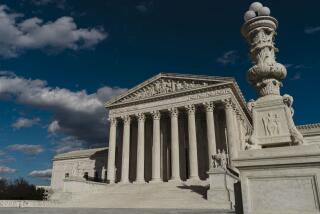Hiding behind the ‘state secrets privilege’
- Share via
In a perfunctory order, the Supreme Court on Monday denied a day in court to five alleged victims of one of the grossest abuses of the war on terror: “extraordinary rendition.” That’s the euphemism for transferring suspects abroad for interrogation and, it’s alleged, torture. Besides denying the five any form of redress for their grievances, the court’s action endorses the federal government’s overuse of the so-called state secrets privilege to short-circuit the judicial process. That makes the court’s action doubly shameful.
The plaintiffs sued a San Jose-based airline services company accused of assisting the CIA in transporting them to foreign countries. But the government — first the George W. Bush administration, then the Obama administration — intervened to block the trial, claiming that if it went forward it would jeopardize state secrets. A closely divided U.S. 9th Circuit Court of Appeals agreed, holding that it would not be acceptable even if the judge considered state secrets claims on a document-by-document basis.
The overuse of the state secrets privilege is the most dismaying of the Bush administration policies to be reaffirmed by the Obama administration. This case exemplified an all-or-nothing approach that will prevent scrutiny not just of rendition but of other alleged excesses in the war on terror. Atty. Gen. Eric H. Holder Jr. has promised that the Justice Department will be more discriminating in asserting the state secrets privilege, but the basic policy remains.
The human cost of an abstraction such as the doctrine of state secrets can be profound. One of the plaintiffs said that while he was imprisoned in Egypt, electrodes were attached to his earlobes, nipples and genitals. A second, held in Morocco, said he was beaten, denied food and threatened with castration. A third said his Moroccan captors broke his bones and cut him with a scalpel.
If these outrages occurred, justice must be done — and in court. (The appeals court suggested that the plaintiffs might be compensated in some other way, such as with payments such as those made to Japanese Americans interned during World War II. Of course, it took decades for those reparations to be made.)
At its best, the Supreme Court has vindicated individual rights that have been ignored by the government. In this case it fell shockingly short of discharging its duty.
More to Read
A cure for the common opinion
Get thought-provoking perspectives with our weekly newsletter.
You may occasionally receive promotional content from the Los Angeles Times.








